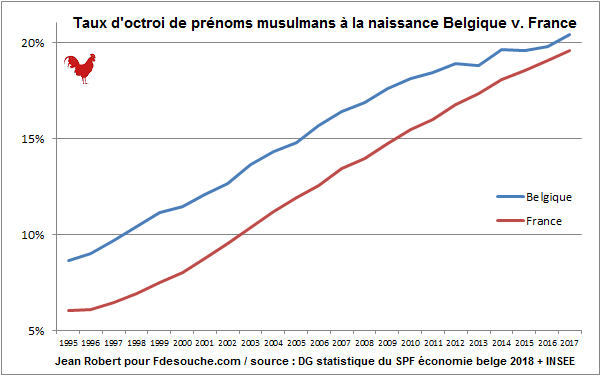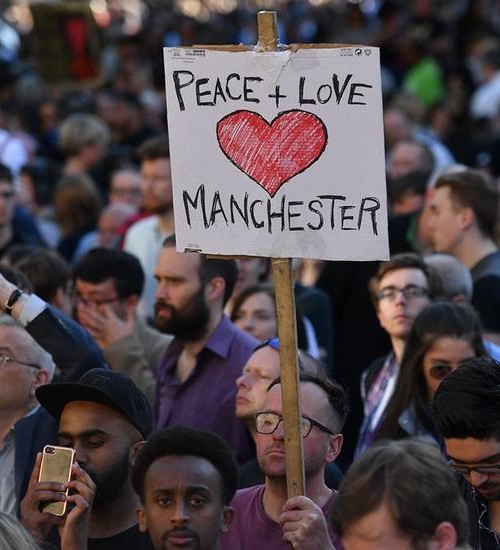The Meaning of “Knife”: Salman Rushdie Pumps His Ego and Helps the Islamic War on Free Speech
Barack Obama was the affirmative-action president. Salman Rushdie is the affirmative-action literary giant. Like Obama, Rushdie didn’t get to the top of his profession thanks to the depth of his talent and power of his intellect. No, he got there thanks to the color of his skin and the leftism of his politics.
Separated by an ocean, united by Islam
And just as Obama harmed Blacks and worsened race relations in America, so Rushdie has harmed the cause he claims to hold most dear: freedom of speech and of the artistic imagination. Still, look on the bright side. Rushdie is now one of the most famous writers in the world, feted by his fellow leftists everywhere from America to the Antipodes. He’s just published a new book with a simple title and pretentious subtitle: Knife: Meditations on an Attempted Murder. It was written in response to the knife attack launched on him in 2022 by one of the countless Third-World savages whom leftists like Rushdie have imported into the West since the Second World War.
 Simplicity and pretension: The cover of Salman Rushdie’s Knife
Simplicity and pretension: The cover of Salman Rushdie’s Knife
He was lucky to survive. But the odds were always far better for him than they were for the Glaswegian shopkeeper Asad Shah, who was attacked by another Third-World savage in 2016. Like Rushdie, Shah was accused of blaspheming against Islam. Unlike Rushdie, Shah wasn’t immediately helped by a friendly crowd when the savage began stabbing. That’s why Rushdie is alive and Shah is dead. But the living Rushdie has never acknowledged the dead Shah or explored the disturbing parallels between those two knife-attacks separated by the Atlantic and united by Islam. Part of the reason for Rushdie’s silence on Shah may be that Rushdie has no desire to share the limelight. I’ve never been impressed by the depth of Rushdie’s literary talent, but I have always been impressed by the size of his ego.
 Asad Shah and his heroic murderer Tanveer Ahmed (image from BBC)
Asad Shah and his heroic murderer Tanveer Ahmed (image from BBC)
Knife is another vehicle for Rushdie’s ego and another opportunity for White and Jewish leftists to shower him with praise. And yes, I agree with some of the praise. Rushdie has responded with courage and humor to a near-fatal assault and months of painful treatment in hospital. But his writing hasn’t gotten any better and his analysis of art and Islamic pathologies hasn’t got any less pretentious or any more honest. The literary critic Erica Wagner said that “Knife is a tour-de-force, in which the great novelist takes his brutal near-murder and spins it into a majestic essay on art, pain and love.” She also described how Rushdie tries to understand his would-be assassin, a Lebanese migrant called Hadi Matar:
About two-thirds of the way through Knife, Rushdie conducts his own imaginary interview with this assailant, “my would-be Assassin, the Asinine man who made Assumptions about me, and with whom I had a near-lethal Assignation” – Rushdie’s wordplay never fails him — and attempts to conceive of the young man’s motives. (“Review: Salman Rushdie’s memoir is horrific, upsetting – and a masterpiece,” The Daily Telegraph, 15th April 2024)
In fact, Rushdie’s wordplay never fails to be adolescent. And Matar’s “motives” really aren’t as complex or mysterious as Rushdie tries to pretend. In The Satanic Verses, the character based on the Prophet Muhammad bears another piece of Rushdie’s adolescent wordplay. He’s called Mahound. Get it? Rushdie resurrected a medieval European version of Muhammad’s name to associate Muhammad with dogs, which are of course unclean animals in Muslim eyes (Mahound has also been regularly used by Christians to vilify Muhammad as the founder of a false religion). Elsewhere in The Satanic Verses, there are prostitutes named after Mahound’s wives. One of those wives is dead and the prostitute named after her incites “necrophilia” in her clients, “who forbade her to make any movements.” Rushdie was mocking and subverting Islam. Orthodox Muslims have responded to the mockery and subversion in entirely healthy and predictable fashion: by trying to kill him.
The evils of Islam
It’s entirely healthy from the point of view of Islam, that is. Orthodox Muslims believe in being feared, not in being loved or admired for their tolerance. Whereas Christianity in the West tolerates abominations like Piss Christ (1987) and continues to decay and dwindle, Islam in the West responds with violence to abominations like The Satanic Verses and continues to grow in size, power, and influence. There was a very simple way of avoiding this problem, but for obvious reasons Rushdie and his supporters refuse to mention it. Non-White Muslims should never have been allowed to colonize the West. As it is, not only have Muslims been allowed to colonize the West: they’re being heavily subsidized to breed and to deepen the roots of their evil religion.
And I think “evil” is a fair description of Islam. Take this horrible story from fourteen years ago:
My mum has always had a special place in her family because she was the first girl to live beyond childhood. Five of her sisters died as babies or toddlers. It was not until many years later that anyone worked out why so many children died and three boys were born deaf. Today there is no doubt among us that this tragedy occurred because my grandparents were first cousins. …
My family is not unique. In the UK more than 50 per cent of British Pakistanis marry their cousins – in Bradford that figure is 75 per cent – and across the country the practice is on the rise and also common among East African, Middle-Eastern and Bangladeshi communities.
Back when my grandparents were having children, the medical facts were not established. But today in Britain alone there are more than 70 scientific studies on the subject. We know the children of first cousins are ten times more likely to be born with recessive genetic disorders which can include infant mortality, deafness and blindness.
We know British Pakistanis constitute 1.5 per cent of the population, yet a third of all children born in this country with rare recessive genetic diseases come from this community. Despite overwhelming evidence, in the time I spent filming Dispatches: When Cousins Marry, I felt as if I was breaking a taboo rather than addressing a reality. Pakistanis have been marrying cousins for generations. …
Throughout I had to remind myself that this is a health story – nothing more. It is not about religion or cultural identity. It is about avoidable suffering such at that experienced by Saeeda and Jalil Akhtar, whom I met in Bradford. They are first cousins and have six children, three with the genetic disease mucolipidosis type IV. This stops the body getting rid of waste properly and affects brain functions controlling vision and movement.
Mohsin, their second eldest, is 17 and blind. He wanders aimless and helpless, often crying in frustration. His sisters Hina, 13, and Zainab, 11, have the same condition. They live in almost complete darkness. Saeeda is worn down from years of round-the-clock care. She spoon-feeds them, dresses them and fears for them. Neither she nor her husband can quite accept that their familial link is the cause of this pain.
This is a major public health issue that has huge implications for other services. The cost to the NHS is many millions of pounds. On average, a children’s hospital will see 20 to 30 recessive gene disorders a decade, but one hospital in Bradford has seen 165, while British Pakistani children are three times more likely to have learning difficulties, with care costing about £75,000 a year per child. However during this investigation we found no efforts to introduce any national awareness-raising campaign. Why? (“The greatest taboo: One woman lifts the lid on on the tragic genetic consequences of when first cousins marry,” The Daily Mail, 23rd August 2010)
The answer to the question is simple. Why? Because leftists would much rather allow children to suffer horrifically than criticize a doubly sacred minority: brown-skinned Muslims. Leftism collaborates with the evil of Islam. For further examples, take Asad Shah again. If Rushdie had, per impossibile, tamed his egomania in Knife and written about Shah’s murder, he would have had to begin the story with the death-sentence imposed in Pakistan on a Christian woman called Asia Bibi. Her conviction for blasphemy against Islam was grossly and blatantly unfair, but it was enthusiastically supported by mainstream Muslim groups in Pakistan.
 A mainstream mosque in Maryland honors the hero-martyr Mumtaz Qadri
A mainstream mosque in Maryland honors the hero-martyr Mumtaz Qadri
When a Muslim politician called Salmaan Taseer began to campaign on Asia Bibi’s behalf, one of Taseer’s bodyguards expressed his disapproval by machine-gunning Taseer to death. The bodyguard, Mumtaz Qadri, then peacefully surrendered to the authorities and calmly accepted his subsequent execution for murder. His photo later appeared on a poster issued by a mainstream mosque in Maryland, USA. Pakistani colonists in America were celebrating the anniversary of his death and hailing him as a ghazi-shahid, a hero-martyr.
Headchopping for Muhammad
Are Salman Rushdie and his leftist admirers disturbed that Muslims in America are celebrating Mumtaz Qadri, a murderer for Muhammad and dedicated enemy of free speech? They should be. After all, it’s certain that Qadri would just as happily have machine-gunned Salman Rushdie as he machine-gunned Salmaan Taseer. But Rushdie and his fellow leftists have ignored the mosque in Maryland. They don’t want to face the true scale of the disaster they’ve inflicted on the West. That’s also why Rushdie and his fellow leftists have ignored the murder of Asad Shah in Glasgow, which was carried out in direct imitation of Mumtaz Qadri by a Pakistani migrant called Tanveer Ahmed. That murder earnt Ahmed the title of ghazi, “hero,” but Britain no longer has the death-penalty, so he didn’t go on to become a shahid, “martyr,” too.
Many other Muslims in Britain would be very happy to earn the title of ghazi. That’s why a schoolteacher who worked in the Yorkshire town of Batley is still in hiding. He showed his religious-studies class some satirical cartoons of Muhammad in 2021 and roused the wrath of local “Islamists,” as conservatives and libertarians dishonestly call them. They’re not Islamists: they’re mainstream Muslims. And the death-threats they issued to the teacher were entirely believable. After all, a teacher called Samuel Patey had recently been beheaded by an “Islamist” in France after he was falsely accused of showing blasphemous cartoons of Muhammad to one of his classes. Libertarians and conservatives blame such murders not on Muslim migration but on “liberal cowardice.” We’ve got to act robustly in defense of free speech and stop treating Muslims like children. But a decadent Western state that allows mass migration by Third-World savages is never going to act robustly against them.
To ask is to answer
And what if, per impossibile, Britain did begin to “act robustly”? Suppose the state had responded to the death-threats in Batley by hunting down and jailing those who had issued or inspired them. Would that have pacified or inflamed the situation? Would the “Islamists” have been cowed or emboldened by this infidel persecution? Would those sent to jail have seen the error of their ways and ended their sentences as staunch supporters of free speech? Merely to ask the questions is to answer them. There are only two kinds of “robust action” that will solve the worsening Third-World pathologies in the West, including the Muslim war on free speech. The first is an immediate and permanent end to Third-World migration into the West. The second is the deportation of all non-Whites now resident on Western soil back to their homelands.
But leftists and their libertarian allies can’t admit the truth. That’s why they’ll turn Knife into a best-seller. It offers them comforting fantasy rather than uncomfortable reality. And note that Rushdie can’t even be realistic about the central fact of the book: the vicious attempt on his own life. He indulges in adolescent wordplay about “my would-be Assassin, the Asinine man who made Assumptions about me, and with whom I had a near-lethal Assignation.” But an “assignation” is agreed by both parties. Rushdie didn’t agree to that meeting with a Third-World savage. It was imposed on him against his will. Just as Third-World migration has been imposed on ordinary Whites against their will by the hostile elites of Western nations. Unlike Salman Rushdie, countless ordinary Whites have not survived their one-sided “assignations” with Third-World savages. I wrote about one of those ordinary Whites in an earlier article about Rushdie and his “asinine assassin.” In the same month as the attempted murder of Rushdie, an 87-year-old grandfather called Thomas O’Halloran was murdered in a “shocking act of unprovoked violence” whilst riding his “mobility scooter in broad daylight.” A Black career criminal called Lee Byer is due to go on trial for the murder.
A choice between truth and lies
Leftists ignored the actual murder of Thomas O’Halloran, but wailed in shock and horror about the attempted murder of Salman Rushdie. And now, in April 2024, they’re heaping praise on Rushdie’s Knife and ignoring the murder of another White grandfather by another Third-World savage. A so-called asylum-seeker called Ahmed Alid has just been found guilty of murdering 70-year-old Terence Carney in October 2023. Like Hadi Matar, Salman Rushdie’s would-be assassin, Alid used a knife. Unlike Matar, he was successful in slaying an infidel for Islam.
 Two Third-World savages imported by leftists: Hadi Matar and Ahmed Alid
Two Third-World savages imported by leftists: Hadi Matar and Ahmed Alid
But there will be no close analysis of Terence Carney’s murder by leftists like Salman Rushdie. That’s why I can reach a simple conclusion. I don’t know the meaning of life but I do know the meaning of Knife. Rushdie’s tour-de-force is yet more proof of how leftists never hesitate when given a choice between truth and lies, between reality and fantasy, between facing facts and feeding their own egos. It’s lies, fantasy and ego every time.

 “Open borders for Israel!”: lying Jewish propaganda is turned back on its Jewish creators
“Open borders for Israel!”: lying Jewish propaganda is turned back on its Jewish creators Jewish control is very bad for the West, but Israel is not uniquely evil
Jewish control is very bad for the West, but Israel is not uniquely evil An innocent woman in terror of a mainstream Muslim mob: the Arabic script says halwa, meaning “sweet”
An innocent woman in terror of a mainstream Muslim mob: the Arabic script says halwa, meaning “sweet”
 Islamic Hero #1: Ilm ud-Deen, who murdered for Muhammad in India (image from the movie
Islamic Hero #1: Ilm ud-Deen, who murdered for Muhammad in India (image from the movie  Islamic Hero #2: Mumtaz Qadri, who murdered for Muhammad in Pakistan (the poster is for a celebration of Qadri in a
Islamic Hero #2: Mumtaz Qadri, who murdered for Muhammad in Pakistan (the poster is for a celebration of Qadri in a  Islamic Hero #3: Tanveer Ahmed, who murdered for Muhammad in Britain (Ahmed is described as ghazi, “hero,” and his victim Asad Shah as kazzab, “liar”)
Islamic Hero #3: Tanveer Ahmed, who murdered for Muhammad in Britain (Ahmed is described as ghazi, “hero,” and his victim Asad Shah as kazzab, “liar”) A Muslim offers some wholesome head-chopping advice in Hindi script (
A Muslim offers some wholesome head-chopping advice in Hindi script (






